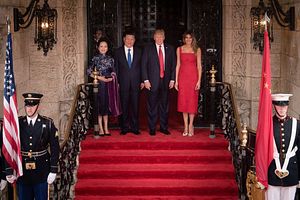Addressing the critical threat created by North Korea and its sponsor and ally, China, earlier this week Secretary of State Rex Tillerson delivered a couple of conventional diplomatic statements that are rapidly becoming outdated and will soon be overtaken by events.
In a press briefing previewing his trip to Asia, the secretary, while acknowledging that China could do more to halt Pyongyang’s nuclear and ballistic missile programs, effectively gave Beijing the usual pass on its complicity. “The Chinese have been very clear with us that we share the same objective, a denuclearized Korean Peninsula,” Tillerson said. “[…]We certainly don’t blame the Chinese for the situation in North Korea. Only the North Koreans are to blame for this situation.”
This surprisingly walked back his condemnation of China and Russia only a day earlier as the “principal economic enablers” of North Korea’s weapons programs — a position consistent with candidate/President-elect/Pres
“North Korea is behaving very badly. They have been ‘playing’ the United States for years. China has done little to help!” Trump tweeted in March.
Tillerson’s odd China absolution came just after a display of Congress-executive branch bipartisanship over Beijing’s collusion with North Korea. Over the weekend, Senate Minority Leader Charles Schumer (D-NY) called for robust new sanctions — a strong endorsement of Trump’s get-tough policy with China. “If China continues to passively address North Korea, I urge you to use your authority… to suspend the approval of all mergers and acquisitions in the U.S. by Chinese entities,” Schumer wrote in a letter to Trump.
The president had given fair and frequent warning that Beijing must end its decades-long indulgence of North Korea’s reckless behavior or bear the consequences in its relations with Washington. He even wooed Chinese leader Xi Jinping and his wife with lavish hospitality and high praise during their April meeting in Mar-a-Lago, again directly stating his expectation that China could, and would, help solve the problem it had substantially helped create.
“I have great confidence that China will properly deal with North Korea. If they are unable to do so, the U.S., with its allies, will!” Trump tweeted one week after the meeting.
Even as he was wining and dining his Chinese counterpart, the president reinforced his message by launching a cruise missile attack on Syria in retaliation for Bashar al-Assad’s use of chemical weapons against his people. This would be an American leader who would enforce red lines, not meekly walk away from them.
After weeks of patiently waiting for China to act, Trump concluded that the effort would yield no progress and tweeted that he must now proceed to the next phase of his strategy: “I am very disappointed in China… they do NOTHING for us with North Korea, just talk. We will no longer allow this to continue. China could easily solve this problem!”
As U.S. sanctions begin to bite and relations with Washington sour further, Beijing may wish to reconsider the path it has chosen with North Korea. Despite Tillerson’s recent softer words, an escalation of tensions with this president would be an unwise course of action.
The secretary’s other obligatory bow to statecraft was the standard assurance American officials have been providing a paranoid Pyongyang for over 60 years: “We do not seek a regime change. We do not seek the collapse of the regime. We do not seek an accelerated reunification of the Korean Peninsula. We do not seek an excuse to send our military north of the 38th parallel.”
Successive Kim regimes have responded to such reassuring words by relentlessly developing nuclear weapons and the means to deliver them — all with China’s indispensable material, technological, financial, and diplomatic support. For over two decades, Beijing has successfully evaded responsibility for its enabling role by pleading that stronger sanctions would precipitate regime collapse and trigger a flood of refugees across the Chinese border.
It is time to call Beijing’s hand and turn the specious argument on its head. The Trump administration should make clear that ending the Pyongyang regime, by one means or another, will be precisely the aim of U.S. policy if the existential nuclear threat continues.
For humanitarian reasons alone, the world would be a better place without the odious Kim clique. But the West has always made a different moral calculation regarding the lesser of evils. It has been deemed more responsible to stand by and allow the North Korean people to endure their inhuman treatment rather than risk war that would presumably inflict even greater suffering on them and on wider populations. The United Nations doctrine of humanitarian intervention — the “Responsibility to Protect” oppressed populations — has not been seriously considered in the North Korean case. And the risks of inaction have continued to grow.
But the calculus has gradually changed as North Korea threatens South Koreans, Japanese, and even Americans with nuclear holocausts — now the risk of prudent and well-planned military action may seem more worth taking. A China acting like the responsible international stakeholder Xi purports to be would work seriously with the West toward both denuclearization and rehumanization of the North Korean people. The ultimate goal would be peaceful reunification.
But Beijing’s interests and values may have more in common with Pyongyang’s than with the international community’s. If so, it is time for the West to recognize that reality and end the addictive and dangerous wishful thinking that has characterized policy toward China for 40 years.
Joseph Bosco is a former China country director in the office of the secretary of defense, 2005-2006.













